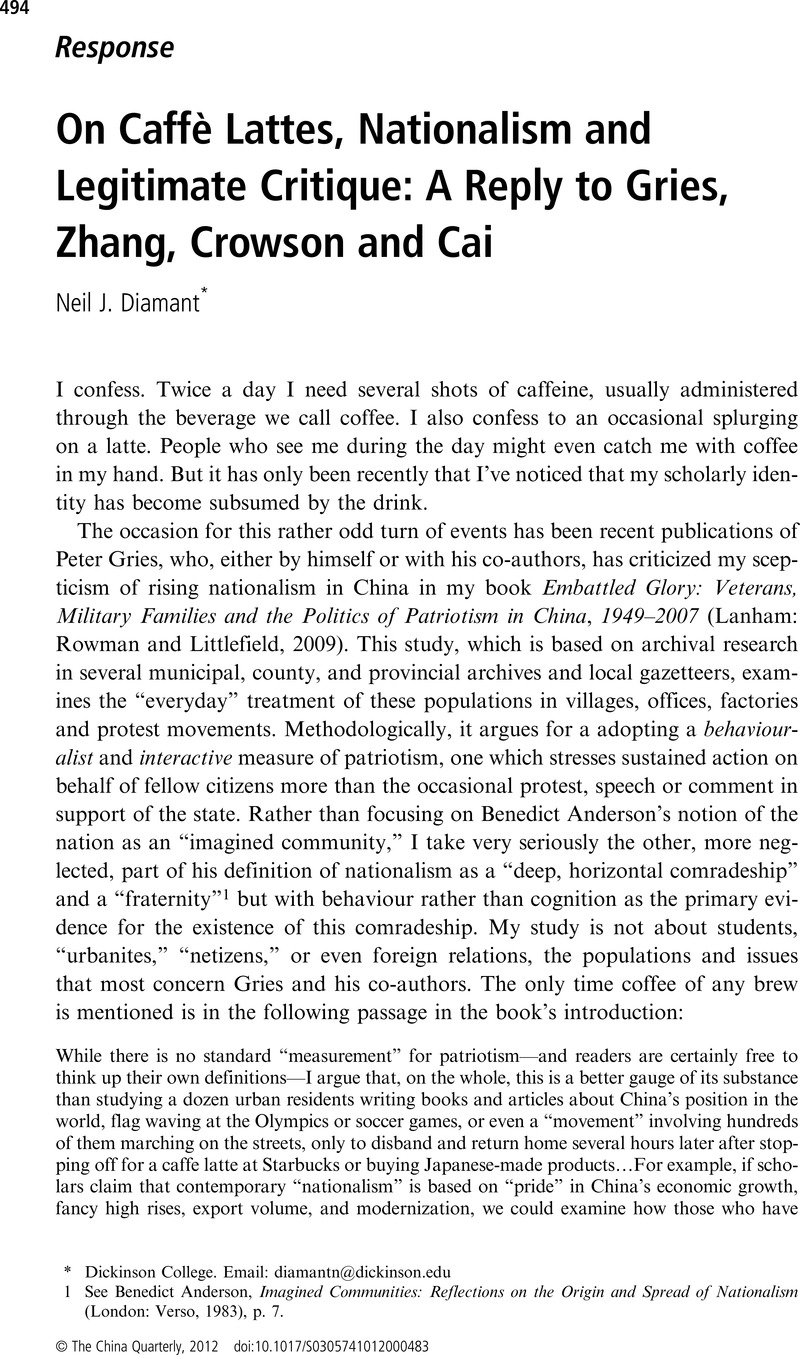Article contents
On Caffè Lattes, Nationalism and Legitimate Critique: A Reply to Gries, Zhang, Crowson and Cai
Published online by Cambridge University Press: 29 June 2012
Abstract

- Type
- Response
- Information
- Copyright
- Copyright © The China Quarterly 2012
References
1 See Anderson, Benedict, Imagined Communities: Reflections on the Origin and Spread of Nationalism (London: Verso, 1983), p. 7Google Scholar.
2 Embattled Glory, pp. 22–3.
3 See Gries, Peter Hays, “Experimental Methods and Psychological Measures in the Study of Chinese Foreign Policy,” in Carlson, Allen, Gallagher, Mary E., Manion, Melanie and Lieberthal, Kenneth (eds.), Contemporary Chinese Politics: New Sources, Methods and Field Strategies (Cambridge: Cambridge University Press, 2010), p. 83Google Scholar.
4 Ibid.
5 Gries, Peter Hays, Zhang, Qingmin, Crowson, H. Michael and Cai, Huajian, “Patriotism, Nationalism and China's US Policy: Structures and Consequences of Chinese National Identity,” The China Quarterly, No. 205, p. 4Google Scholar
6 Ibid., p. 17.
7 As R. Keith Schoppa writes of refugees in Zhejiang Province during the anti-Japanese War, “I found precious little evidence of overt nationalism or patriotic fervor…As war came, individuals and families desperately strove to spread a protective mantle over themselves—saving themselves, their families and their native places; the local, not the nation, became the focus.” See In a Sea of Bitterness: Refugees during the Sino-Japanese War (Cambridge, MA: Harvard University Press, 2011), p. 309Google Scholar.
8 See “Crisis and Governance: SARs and the Resilience of the Chinese Body Politic,” The China Journal, No. 61 (2009), pp. 23–48Google Scholar.
9 In a recent essay James Leibold notes that the “Sinophone blogosphere is producing the same shallow infotainment, pernicious misinformation, and interest-based ghettos that it creates elsewhere in the world,” and wonders whether digital activism “is being snuffed out by the full flicker and gentle tapping of millions of isolated, individual computers and their smiley-faced bloggers.” See “Blogging Alone: China, the Internet, and the Democratic Illusion?,” Journal of Asian Studies Vol. 70, No. 4 (2011), pp. 1023, 1036Google Scholar.
10 According to recent study of the role of public opinion in China's foreign policy, James Reilly finds that protests over foreign relations are “fundamentally cyclical—following a familiar pattern of rapid swells of anger and activism that may influence policy decisions and discourse, but then quickly recede.” This contingency model is hardly a ringing endorsement for the direct impact of ‘popular nationalism.’ See his Strong Society, Smart State: The Rise of Public Opinion in China's Japan Policy (New York: Columbia University Press, 2012), p. 25Google Scholar. Of course, Reilly, like Gries, cannot know for certain if some of this anger is staged.
11 World Educational Services, “International Student Mobility: Patterns and Trends”. Accessed at http://www.wes.org/educators/pdf/StudentMobility.pdf, December 14, 2011, p.5; Institute for International Education & OpenDoors, “International Student Enrollment Increased by 5 Percent in 2010/11, Led by Strong Increase in Students from China.” Accessed at http://www.iie.org/en/Who-We-Are/News-and-Events/Press-Center/Press-Releases/2011/2011-11-14-Open-Doors-International-Students, December 14, 2011.
12 Leibold, “Blogging Alone,” p. 1027. Leibold's own research focuses on Han cyber-nationalism, not entertainment.
13 Reilly, Strong Society, Smart State, p. 196.
14 Recently purged Chongqing Party Secretary Bo Xilai is an excellent example of some of the issues raised here. Should we deem Bo a “nationalist” because of his promotion of collectivist values in Chongqing? I would argue that his spending a small fortune on tuition for his son, Guagua, to study in the UK and the US (high school, university and graduate school) is the better indicator of his political orientation.
15 Frank, Dana, Buy American: The Untold Story of Economic Nationalism (Boston: Beacon, 2000)Google Scholar.
- 3
- Cited by




